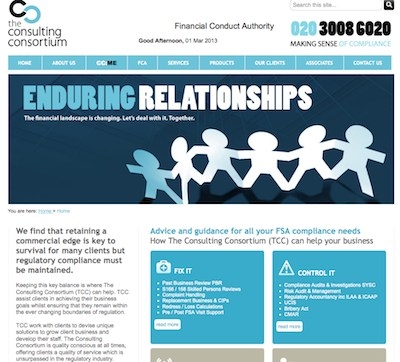Independent regulatory and compliance consultancy The Consulting Consortium is urging financial advice firms to recognise a gap in adviser disclosure documentation.
It says suitability reports alone often do not accurately reflect discussions between customers and advisers.
TCC says the issue was highlighted in the FSA mystery shopper report "Assessing the quality of investment advice in the retail banking sector". TCC, in its white paper "Investment Advice: Ensuring Suitability", highlighted 'disclosure' as an area of concern for the FSA noting that:
• Many suitability reports failed to reflect what was discussed during meetings
• Suitability reports sometimes contained inaccurate information
• Suitability reports often failed to explain disadvantages of the recommendation
TCC's experience in working with financial advice firms corroborates FSA findings in this area. Guidance published by the FSA over the last few years has been explicit in the regulator's requirements for firms to focus on positive consumer outcomes. In some cases the methods chosen by advisers to evidence the suitability of their advice are not enough to satisfy the FSA.
Joanne Smith, chief executive at The Consulting Consortium said: "The FSA's mystery shopper report highlights a problem our consultants experience time and time again; often suitability reports are not enough to evidence suitability. We see firsthand that firms' business monitoring teams are unable to identify unsuitable advice when they carry out their file reviews, as all they have to rely on are the suitability reports.
{desktop}{/desktop}{mobile}{/mobile}
"These reports often do not correlate with customer's risk profiles or personal circumstances. This often leads to firms' complaints handling teams making wrong decisions about customer complaints as they rely on these inaccurate records during their investigations. This is contrary to the FSA's commitment to treat customers fairly (TCF).
"With a dearth of guidance published by the FSA over the last year, intended to assist firms on the quality of advice they give and with a large emphasis placed on 'knowing your client', suitability, one would think, should no longer be an area of concern. Advisers should be considering how they are recording evidence of the real time discussions with clients efficiently and accurately."
The FSA employed a specialist market research firm to conduct the research for their mystery shopper report between March and September 2012. All customer meetings were recorded, so everything that was said between the adviser and the customer was captured. While the FSA found that approximately three quarters of customers received good advice, they had concerns with the quality of advice.
Founded in 2000, The Consulting Consortium (TCC) is an award winning specialist independent regulatory consultancy which provides advice and guidance on all activities regulated by the Financial Services Authority (FSA).

